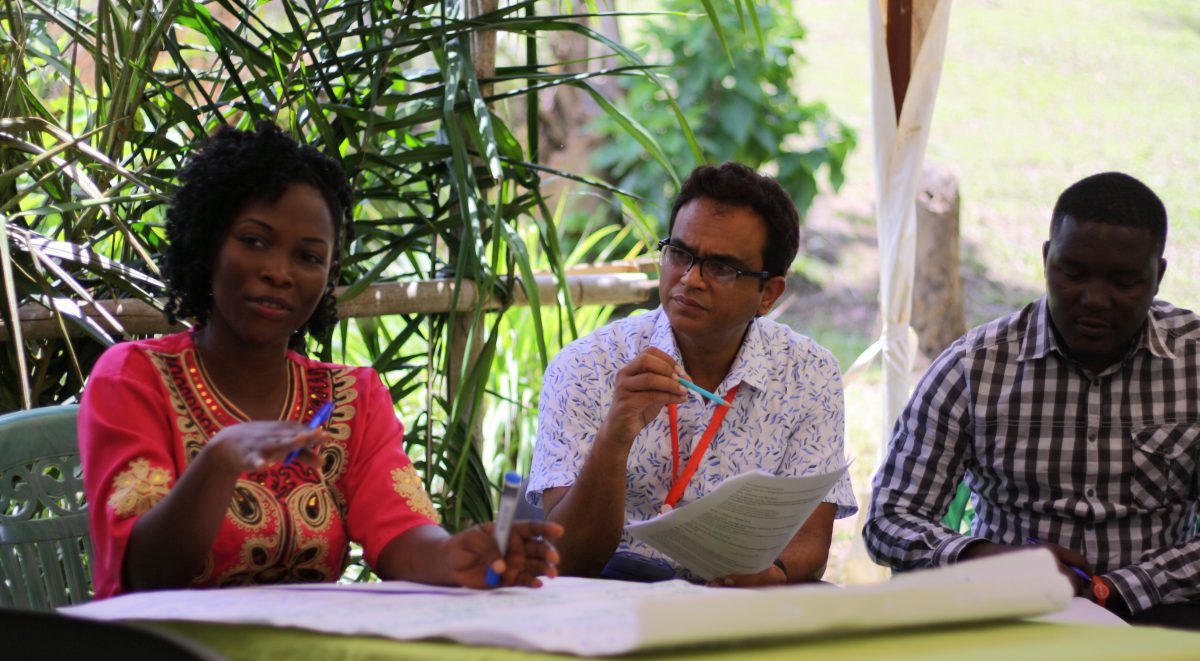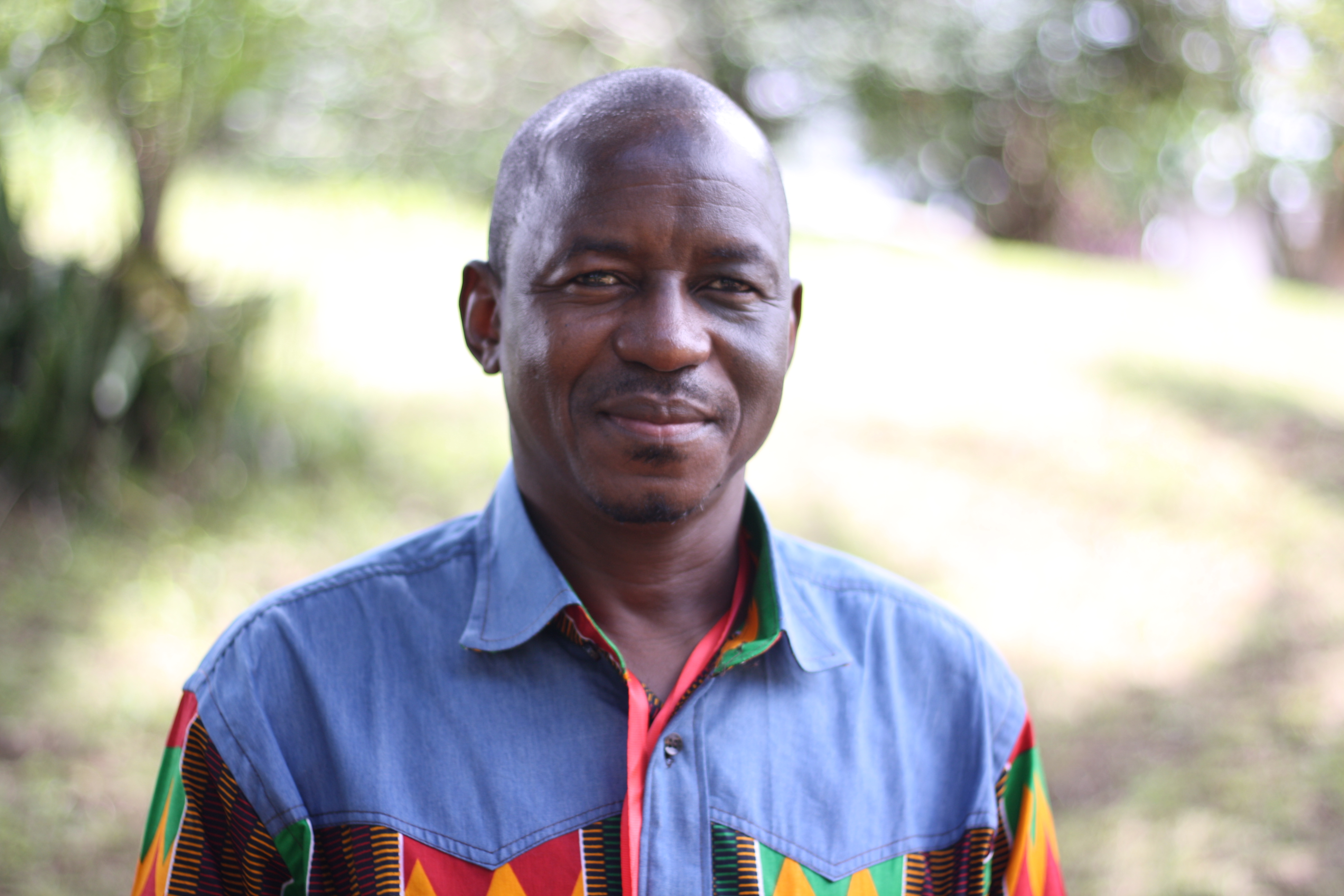
Photo: Perpetua Fodji (Cameroon), Amir Islam (Bangladesh), and Yves Stephane Ngaleu (Cameroon)
discuss development alternatives from small-scale farmers at the “More and Better” gathering in September 2018.Photo credit: T. Hauger
In this month’s “Voices from the South,” Karibu speaks with the newly elected International Coordinator for the More and Better Network, Dr. Mamadou Goïta from Mali. Mamadou provides a glimpse of some of the main challenges for small-scale farmers and fisherfolk in Africa today, gives us a picture about why small-scale sustainable agriculture is a key component to ending poverty and hunger worldwide, and lifts up the main message of many small-scale farmers and fisherfolk in the Global South: “Listen to us!”

Mamadou Goïta
Karibu: Who are speaking about when we describe small-scale farmers and fisherfolk (smallholders)?
Mamadou Goïta: Smallholders are small-scale farmers, pastoralists, forest keepers, fishers who tend areas from less than one hectare to 10 hectares (sometimes a bit larger). Most of these farmers are using mainly family labor for production, and they are using part of the produce or fish for their own families. A majority of the 570 million farms in the world can be considered smallscale, and smallholders supply 80% of overall food produced in Asia, sub-Saharan Africa and Latin America. We are talking about over 1.5 billion people worldwide, mainly in the global South, that live in smallholder households. And a huge amount of people in the world that are fed through these efforts.
What are the main challenges that small-scale farmers and fisherfolk are experiencing globally and here on the African continent?
For a majority of the smallholders here at this meeting, we see primarily challenges at the local level. It really comes down to issues of poverty, development, hunger – what they feel on their bodies each day. Related to this, the participants here have mainly lifted up three key issues:
First, there are huge challenges linked to access to means of production. Access to land is very problematic. In many cases, if you have some access to land, it does not mean it is permanent – only temporary. Access to clean water is getting more difficult, mainly due to climate change. There are also infrastructural challenges, like good roads to move to and from the land.
Second, we see issues related to investments in small-scale agriculture. The financial system is no longer built for small-scale farmers and fisherfolk. Small farmers have the highest loan costs; access to investment is so expensive for most of them. The commercial banks are not used to supporting small-scale farming. And while these is limited investment in agriculture on national levels, much of this goes to large, industrialized corporate farms or fertilizers that are not good for the environment and the future of the soil. The farmers also have a hard time competing with large-scale farmers in terms of access to the market.
Both of these first two challenges relate to processing challenges. Sometimes the farmers produce a lot in one period, but they do not have access to funding for storage facilities for their food. The fish and foods spoil because they do not have means to process it. We need linkages between the market system, the food system, and the production system.
Thirdly, there are policy challenges. We currently have political policies in place where the wealth is not in the hands of the farmers. When new policies are implemented related to fairer agricultural rules on the national or local level, the implementation time before these are considered successes or failures is too short. This means that the farmers are rushing to meet certain “goals”, and they do not have the time to implement things in the way they should.
Do you see any links between these local challenges, and larger systemic challenges?
Yes, there are certainly correlations between these local issues and the systemic – and we need to be working on both levels. While it is the local commissions that need to take responsibility for issues of access to specific plots of land, we see national governments that are agreeing to binding international treaties on trade and agriculture. Many of these international texts will ultimately prevent the farmers from securing their rights, sovereignty and health.
One example can be seen in relation to the EU: African farmers and civil society have repeatedly rejected the importation of genetically modified seeds, and have asked their governments to ban them. The farmers in Africa already have effective, organic approaches to seed and agriculture, which are far more environmentally and farmer-friendly. We anticipate negative impact on small-scale farmers around the world of seed market dominance by a few agricultural companies. Yet, trade deals between EU and African countries have protected the multinational company Monsanto who are making these seeds, and allowed them to continue exports to Africa despite the calls to stop it.
“We have a big mess in the world. The food system can’t be in the hands of the few. If we want transformation, then public resources should be used on food systems that allow for life.”
What types of alternatives are the small-scale farmers and fisherfolk bringing when it comes to development and distribution?
As I mentioned, figures show that 80% of all commercialized food used in the world come from family farm systems – a figure that is recognized by all the international organizations working with agriculture (among others, the UNs Food and Agriculture Organization). This means that the contributions of these farmers are huge, and if their efforts collapse, all the world’s food systems will collapse.
So our main message is “Listen to us” and listen to our alternatives. These farmers and fisherfolk are working for a food and agriculture system that is very different from the system that is currently expanding. They are working for a paradigm shift from industrial agriculture to diversified agro-ecological systems. This means that there is a drastic increase of the support to small-scale agro-ecological and other forms of sustainable agriculture, and not leaving the future of food in the hands of few multi-national companies. This means that there is a focus of the quality of food rather than large amounts of food with poor quality. This means they working to replace the chemical fertilizers with organic fertilizers that protect the soil for the coming generations. This means that we have holistic strategies to grow healthy agro-ecosystems and secure livelihoods.
We have a big mess in the world. The food system can’t be in the hands of the few. If we want transformation, then public resources should be used on food systems that allow for life. This means that we need to invest in this type of agriculture, and to improve the system, and create more jobs in Africa in this way. The decision makers need to have policy coherence so that we can walk in a safe world that is safe for our food system and our future.
More and Better is an international network for support of food, agriculture and rural development to eradicate hunger and poverty. The network works to lobby decision makers in order to achieve vital changes in national and international policies geared towards: a substantial decrease in the number of hungry and undernourished people and those living in poverty; a major increase in support for agriculture, rural development and food in developing countries; and a significant improvements in the quality of support for agriculture, rural development and food. Learn more: http://www.moreandbetter.org
Dr. Mamadou Goïta is a development socio-economist and specialist in education and training systems, and is the Executive Director of Institute for Research and Promotion of Alternatives in Development (IRPAD) in Mali. He works closely with farmers’ organizations in Africa but also other continents, and he was recently elected as the International Coordinator for the More and Better network. He can be reached at : mamadou_goita@yahoo.fr.

